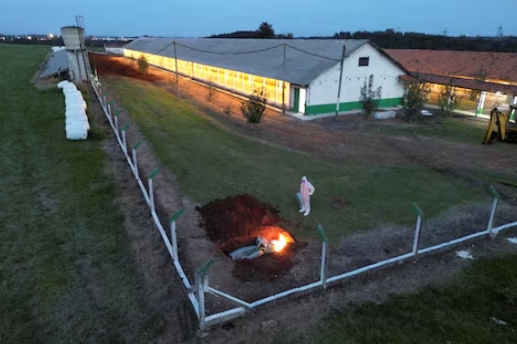
A person wearing a hazmat suit stands next to burning egg cartons and other items in a hole in the ground at a poultry farm after Brazil confirmed its first outbreak of bird flu on Friday, triggering protocols for a country-wide trade ban from top buyer China and state-wide restrictions for other major consumers, in Montenegro,
Several countries have suspended imports of all poultry products from Brazil. These include China, the European Union, Iraq, South Korea, Chile, the Philippines, South Africa, Peru, Albania, Canada, the Dominican Republic, Uruguay, Malaysia, Mauritania, Argentina, East Timor, Morocco, India, Sri Lanka, North Macedonia, and Pakistan. These nations have implemented nationwide bans to address concerns about the spread of the virus, reflecting standard health protocols for poultry trade.
Other countries have limited their restrictions to poultry from Rio Grande do Sul, where the outbreak occurred. This group includes Russia, Belarus, Armenia, Kyrgyzstan, Saudi Arabia, Mexico, Kuwait, the United Kingdom, Oman, Angola, Turkey, Bahrain, Cuba, Montenegro, Namibia, Kazakhstan, Bosnia and Herzegovina, Tajikistan, and Ukraine. By focusing on the affected state, these countries aim to balance trade continuity with health precautions.
A smaller group, including the United Arab Emirates, Japan, Qatar, and Jordan, has restricted imports specifically from Montenegro city. Brazilian Agriculture Minister Carlos Favaro noted: “We are working to contain the outbreak and negotiate a loosening of trade restrictions faster than the two months agreed in protocols.” These targeted measures reflect revised agreements with these nations, allowing for more localized restrictions.
The outbreak has impacted Brazil’s poultry industry, which exported approximately $10 billion in chicken meat in 2024, accounting for 35% of global trade. Rio Grande do Sul contributes 15% of Brazil’s poultry production and exports, with major processors like BRF and JBS operating in the state. BRF CEO Miguel Gularte expressed confidence in containment efforts: “Brazilian health protocols are robust, and the situation will be quickly overcome.” The Agriculture Ministry emphasized that bird flu does not spread through consumption of poultry or eggs, stating: “The Brazilian and world population can rest assured about the safety of inspected products, and there are no restrictions on their consumption.”
Authorities in Montenegro have isolated the affected area, culling 17,000 birds and destroying 1.7 million eggs to prevent further spread. A 28-day observation period began on May 22, 2025, following disinfection of the farm. If no new cases are confirmed, Brazil aims to restore its bird flu-free status, potentially easing trade restrictions. These efforts highlight Brazil’s commitment to maintaining its position in global poultry markets while addressing health concerns.